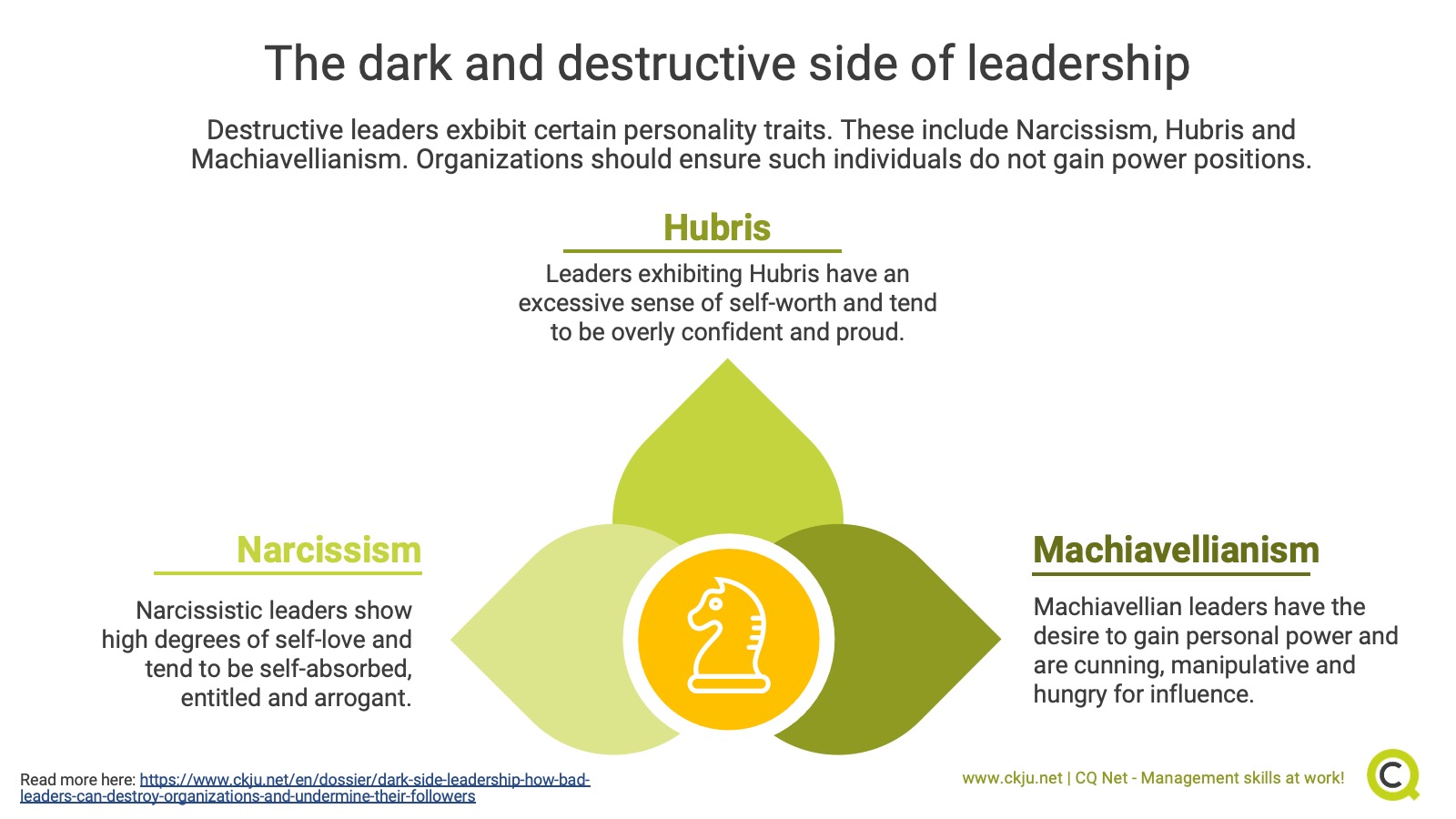- All Management Learning Resources
- dark side of leadership

Why you should care about the dark side of leadership
Leadership in organizations can often be dark and destructive. Utilizing a so-called trait approach is particularly helpful in understanding destructive leaders. Such leaders share common personality traits, notably including narcissism, hubris and Machiavellianism. There are some organizational best practices on how to deal with such destructive leaders who exhibit these very traits. Organizations are best served through identifying these individuals and ensuring they are not placed in positions of power in the first place.
Contents
- Why you should care about the dark side of leadership
- Negative personality traits can predict destructive leadership
- Destructive leaders have a higher risk of leadership derailment
- Narcissism, Hubris and Machiavellianism are three core dark traits of leadership
- How to deal with leaders who exhibit destructive traits?
- Key recommendations for professionals
- References and further reading
Most of the focus on leadership has been on the positive side of leadership, which focuses on ideal characteristics and behaviors for effective leadership. However, in recent years, there has also been a focus on the ‘dark’ or destructive side of leadership and how destructive leaders can undermine the value of their followers. This CQ Dossier describes the characteristics of ineffective/abusive leaders and suggests what organizations can do to reduce the impact of destructive leadership.
Negative personality traits can predict destructive leadership
Lord Acton once said that “power corrupts and absolute power corrupts absolutely.” In the last twenty years, scandals like the Exxon downfall has illuminated that when individuals are placed in leadership positions, they do not always act in an ethical fashion. Recent research on the destructive side of leadership has focused on the personality characteristics of flawed leaders.
Robert Hogan and others have pointed to negative personality traits as predictors of leadership derailment (Hogan & Hogan, 2001; Kippenberger, 1997). There appear to be several personality traits that are related to leader failure yet the three that are consistent across all studies are narcissism, psychopathy, and Machiavellianism, referred to as the “Dark Triad” (Paulhus & Williams, 2002).
Destructive leaders have a higher risk of leadership derailment
Individuals with narcissistic personality are often nominated as leaders by groups or are perceived as having leadership qualities during employment interviews (Paulhus, 1998). However, over time, these individuals tend to be exposed by their peers. Narcissistic individuals are often rejected by their groups because of their arrogance and high-handedness (Paulhus, 1998).
Leadership research typically finds that in terms of managerial derailment, those leaders who fail tend to have negative personality traits (Hogan & Hogan, 2001). Adopting an individual differences approach to leadership can prove beneficial when organizations seek to hire, promote, and develop potential leaders.
Narcissism, Hubris and Machiavellianism are three core dark traits of leadership
In recent years, the trait approach to leadership has fallen out of favor yet current research now suggests it is useful to include a consideration of traits when identifying leaders, particularly those who are flawed (Judge, Piccolo, & Kosalka, 2009). A recent review of the leadership literature identified narcissism, hubris, and Machiavellianism as three core dark traits of leadership (Judge et al., 2009).
Narcissism is characterized by a high degree of self-love
Narcissistic individuals tend to be arrogant, self-absorbed, feel entitled and are hostile. They exhibit a high degree of self-love, believing that they are special and entitled to praise and admiration. However, this exterior is characterized by a shallow self-concept as they tend to view others as inferior to themselves often being insensitive and hostile towards others. They tend to interpret information with a self-serving bias and their decisions lean towards enhancing their own reputation rather than for the good of others.
Hubris is characterized by an excessive sense of self-worth
Leaders with a high degree of hubris tend to have excessive pride, and are overly confident with regard to their knowledge, skills, and abilities. They perceive themselves as much more positive than a realistic assessment shows. Because of this excessive sense of self-worth, they tend to be very defensive when they receive critical feedback (Baumeister et al., 2003).
In fact, they tend to question the competence of the evaluator and devalue negative evaluations. One of the negative consequences of hubris is that these leaders tend to engage in irrational decision-making because of the inflated view they have of themselves. This can lead to financial losses for the firm (Hayward & Hamrick, 1997).
Machiavellianism characterized by the desire to gain personal power
The personality trait of Machiavellianism is derived from the author Machiavelli who wrote The Prince, a 16th century guide on how to gain power and prestige. Individuals who score high on Machiavellianism tend to be cunning, manipulative and will use whatever means necessary to gain political power. Despite the age of the book, many of the lessons are topical (Judge et al., 2009), encouraging leaders to lie, manipulate and forcefully persuade followers towards the mission of the leader.
Typically, the mission is designed to serve the needs of the leader rather than the community. Leaders who are Machiavellian are politically oriented and seek control over their followers. They are also skilled in impression management techniques with a natural talent for influencing others.
They do not seek to do good in the organization through adhering to moral or ethical standards and are more focused on maximizing opportunities for their own personal power. Abusive supervision can be one means to achieve their goals.
How to deal with leaders who exhibit destructive traits?
One of the biggest issues for organizations is how to deal with derailed leaders, particularly those who exhibit these dark personality traits. Individual differences in leaders are largely due to genetics so the implication is that organizations should be wary of promoting and selecting individuals who score high on these dark traits.
Preventing destructive personalities from entering power positions is vital
These dark personality traits also appear to be important in inhibiting growth and leader development (Harms, Spain & Hannah, 2001). This implies that there is little that organizations can do in dealing with leaders who exhibit dark personality characteristics.
However, Harms and colleagues reject this notion because research in clinical psychology suggests that even clinical levels of personality disorders can be treated with appropriate interventions. For now, however, it seems prudent to err on the side of caution and ensure that individuals with dark personality traits are not selected or promoted as leaders.
The Five Factor Personality Model can help determine individual traits
Structured interviews or personality tests for selection and recruitment such as the Five Factor Model of Personality are proper means to identify negative leadership traits already during selection and leadership development.
In conclusion, this dossier describes the main personality traits that are associated with destructive leadership. The paper describes the behaviors exhibited by leaders who are narcissistic, psychopathic, prone to Machiavellianism, and full of hubris.
These sub-clinical traits tend to impede leader development and improvement and can also damage the reputation of the organization and result in financial losses. Organizations can utilize selection tests to ‘weed’ out individuals who exhibit these traits and ensure that they are not groomed for leadership positions.
Key recommendations for professionals
- Destructive leaders exhibit certain personality traits
- The so-called "dark triad" of such traits is narcissism, hubris, and Machiavellianism
- Leaders who exhibit dark personality traits tend to perform less well and have a negative impact on the organization
- Organizations tend to lose financially when leaders exhibit these dark personality traits
- It is hard to get rid of destructive leaders when they are already in positions of power
- Organizations can review their selection and promotion procedures to ensure that only ethical individuals are promoted
Management skills newsletter
Join our monthly newsletter to receive management tips, tricks and insights directly into your inbox!
References and further reading
Baumeister, R. F., Campbell, J. D., Krueger, J. I., & Vohs, K. D. (2003). Does high self-esteem cause better performance, interpersonal success, happiness, or healthier lifestyles? Psychological Science in the Public Interest, 4, 1−44.
Harms, P. D., Spain, S. M., & Hannah, S. T. (2011). Leader development and the dark side of personality. Leadership Quarterly, 22, 495-509.
Hayward, M. L. A., & Hambrick, D. C. (1997). Explaining the premiums paid for large acquisitions: Evidence of CEO hubris. Administrative Science Quarterly, 42, 103−127.
Hogan, R., & Hogan, J. (2001). Assessing leadership: A view from the dark side. International Journal of Selection and Assessment, 9, 40–51.
Judge, T., Piccolo, R., & Kosalka, T. (2009). The bright and dark sides of leader traits: A review and theoretical extension of the leader trait paradigm. The Leadership Quarterly, 20, 855–875.
Kippenberger, T. (1997). The dark side of leadership: What drives people to become leaders? The Antidote, 2, 11–13.
Paulhus, D. L., & Williams, K. (2002). The dark triad of personality: Narcissism, Machiavellianism, and Psychopathy. Journal of Research in Personality, 36, 556–568.
Paulhus, D. (1998). Interpersonal and intrapsychic adaptiveness of trait self-enhancement. Journal of Personality and Social Psychology, 74, 197–208.
About the Author







